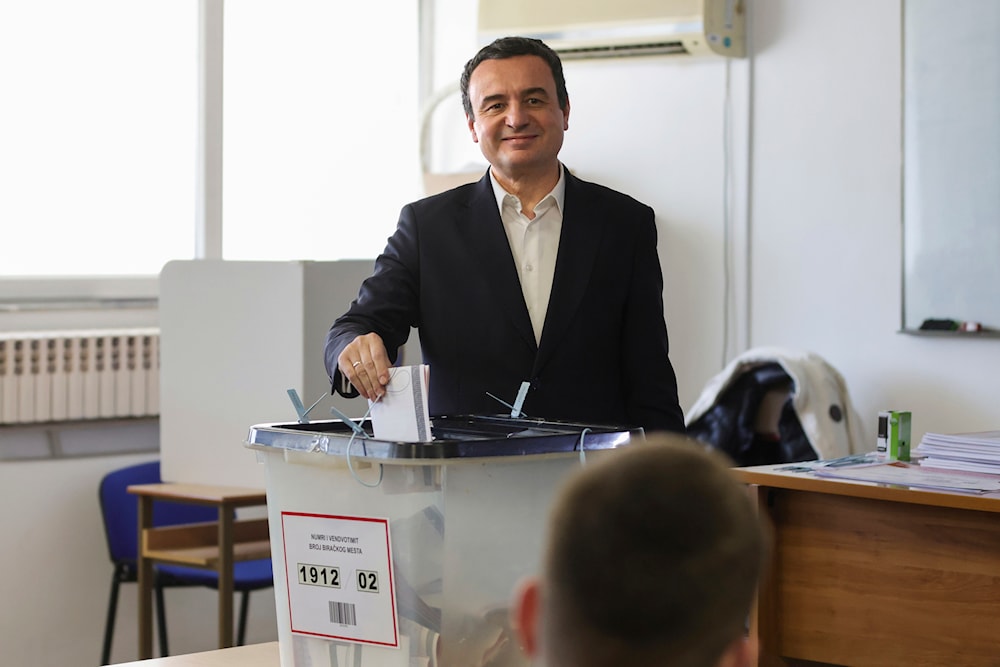Kosovar ruling party announces elections win despite losing majority
With 73% of the votes counted, Prime Minister Albin Kurti’s leftist Self-Determination Movement Party (Vetevendosje) had secured 41.99%, a decline from the more than 50% it won in 2021.
-

Albin Kurti, President of the left-wing Vetevendosje party, casts his ballot as Kosovo holds a parliamentary election in Pristina, Kosovo, Sunday, February 9, 2025 (AP)
Kosovo’s ruling Vetevendosje party is poised to win the country’s parliamentary elections but will need to form a coalition with other parties to secure a governing majority, according to exit polls and preliminary results.
With 73% of the votes counted, Prime Minister Albin Kurti’s leftist Self-Determination Movement Party (Vetevendosje) had secured 41.99%, a decline from the more than 50% it won in 2021. However, the result positions Kurti to lead the next government in a country where politics are heavily shaped by relations with neighboring Serbia and the Serb community within Kosovo.
During the campaign, Kurti had ruled out forming a coalition, stating he would not govern without winning an outright majority. However, after declaring victory on Sunday night, he confirmed he would form a new government, without specifying potential coalition partners.
“We are the first party, the winning party that will create the next government," Kurti told reporters. “We will continue to finish the work that we have started."
Following the announcement, Vetevendosje urged supporters to take to the streets in celebration.
Kosovo’s election commission was unable to release full results on Sunday due to software failures, forcing officials to collect data manually.
The opposition Democratic League of Kosovo (LDK) conceded defeat, with its leader, Lumir Abdixhiku, confirming that Vetevendosje had won 39.08% of the vote, while the opposition Democratic Party of Kosovo came second with 21.84%, and the LDK third with 18.14%.
Three exit polls indicated Kurti’s party secured between 37% and 40.04% of the vote.
Kurti first came to power in 2021 when Vetevendosje won over 50% of the vote, securing a seven-seat majority in Kosovo’s 120-seat parliament.
Kosovo, Europe’s youngest country, declared independence from Serbia in 2008 with US backing, following NATO’s 78-day bombing campaign against Serbian forces in 1999.
Kurti’s popularity has been strengthened by efforts to assert government control in Kosovo’s Serb-majority north. However, critics argue he has failed to improve education and healthcare and that his policies have strained ties with traditional allies, including the European Union and the United States.
In 2023, the EU imposed economic restrictions on Kosovo over its role in escalating tensions with ethnic Serbs, cutting at least €150 million ($155 million) in funding, according to Reuters.
The center-right LDK campaigned on restoring ties with the US and the EU and securing NATO membership.
Despite criticism, Kurti’s government has achieved economic progress. Unemployment has fallen from 30% to around 10%, the minimum wage has increased, and Kosovo’s economy grew faster than the Western Balkans average last year.
The election campaign was marked by intense disputes. The Elections Complaints and Appeals Panel, which oversees complaints from parties and candidates, issued fines totaling more than €650,000—three times the amount recorded in 2021—according to data from the NGO Democracy in Action.

 3 Min Read
3 Min Read










